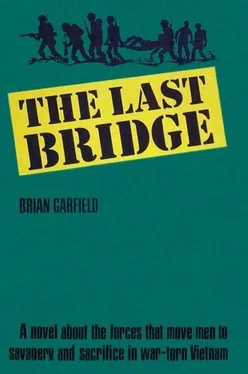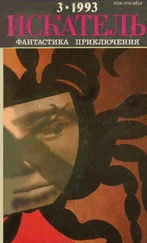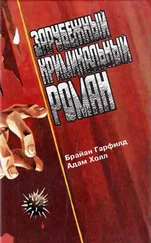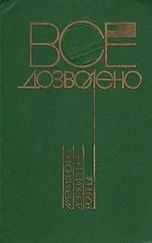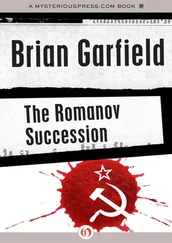A crosswind took the plane. It crabbed in toward the mountain. McKuen hit the ailerons and sideslid to starboard, losing altitude as he did so. The number two engine began to run unevenly. “Two or three cylinders not firing over there,” McKuen said. “Where in hell is that bloody landing strip? Mother of God.”
The plane rattled and struggled to maintain altitude. Rain battered it, and visibility became worse as they flew under a darkening bank of cloud. They were well below the mountaintop; it reared up out of sight into the storm; the slope of the mountain slipped past their left wingtip, black with rocks and foliage. There did not seem to be a single break in the rain forest. Shannon said, “I’m cold. My ears are cold. Do you think we overshot it?”
“I’ll turn around if it don’t turn up pretty quick.”
Ahead of them loomed the serrates of higher mountains. They would have to climb quickly — could the gooney make it? Number two sputtered. “Give us a richer mixture,” said McKuen.
“I hope it’ll—” Shannon began, and then lunged forward in his seat. “That’s it — there it is, Lieutenant. The strip.”
“Where? For God’s sake where?”
“Down there, Lieutenant. See it? Right beyond that ridge.”
The gray top of a sloping ridge slipped beneath the wings, and McKuen saw it then, an uptilted ribbon of dirt and steel sliced into the rain forest, and he said, “Jesus. A cliff droppin’ off at the lower end and a mountain at the upper end. Ducky — ducky.”
“What are you doing? We’re going past it, Lieutenant!”
“Got to circle around and come in from the north. The air up here’s just about thin enough to hold us up if we maintain a hundred and ten miles an hour. How are we supposed to land on that postage stamp at high speed?”
“Lieutenant, are you asking me ?”
McKuen looked at Shannon and felt a sudden impulse to pat the young man on the head. “All right,” he said, “just you relax now, Mister. Turn down the cabin lights so I can see out. Flaps.”
“Full?”
“Half. Damn it.” He put the propellers on low pitch to grab as big a bite of air as they could swallow; he swung around in a narrow skidding circle and lined the rattling plane up with the runway and cut his engines back. Number two coughed. “If that engine packs up now,” he said, and did not finish the statement. “Full flaps, now.”
The plane seemed to stop; there was no sensation of movement, only sight of the runway climbing toward them. “Mother of God, do see to it we don’t stall, hey? Cut those lights, Mister. Bloody hell. If I overshoot the near end by as much as a hundred feet, we’re greased.” He nudged the nose down a fraction more. “Gear down, Mister.”
“Gear down.” McKuen heard the sluggish snapping of the wheels locking into place. The runway came up fast against them now. He glimpsed the face of the glistening cliff dropping down away from the near end of the airstrip. “What’s our airspeed?”
“Hundred and five,” Mister Shannon said.
Number two coughed and jangled. A downdraft in the unstable mountain air shoved the right wing down, and McKuen fought to level it. There was nothing now but the lift of his own hard-breathing chest and the rush of wind and the plane, threatening to stall and plunge them into the gleaming cliff face at 105 miles an hour. McKuen lifted his eyes momentarily to the mountain heaving up, high and solid at the far end of the strip — “One way to stop an aeroplane,” he muttered. “Thank the saints they put reversible props on this crate.”
“I hope the wheel brakes hold,” said Shannon.
They roared down upon the brink of the cliff, and McKuen pushed the props to high pitch, purposefully stalling the plane. It would be rough and nose-down, but it was the fastest way to stop. The nose dropped, and for a moment he wondered if he had miscalculated, if the wheels would catch the edge and the plane trip on them and flip over on its back; that instant’s horror froze in his mind, and then the wheels touched ground, very hard, jarring him in his seat. He raced the engines to bring the tail down. The tailskid bounced, and McKuen applied the brakes gently at first, and then when the tail settled down and he was halfway up the tiny uptilted airstrip he reversed the propellers and gave the engines every bit of power he could slam into them. Number two sputtered and would not get up to full power, and the plane began to skew around; he had to reduce the fuel flow to number one. He heard Shannon shouting something in a hysterical voice. The wheels drummed on the perforated-steel mesh of the airstrip, making a scrubbing noise. Thick, dark forest rushed past on both sides. He had his rudder braced hard over to compensate for the weaker pull of number two. And when the plane jolted to its halt he saw the black rim of the forest not twenty feet in front of the nose of the plane.
He broke his grip on the wheel and wiped an unsteady hand across his forehead.
Someone turned the engines off; it must have been Shannon. Shannon said, “That makes it two cases of Irish whisky I’m buying you, Lieutenant. Holy Jesus.”
McKuen sat and trembled. He heard Shannon unsnapping the seat belt and clicking switches off. McKuen turned and put his hand on Shannon’s arm with brief pressure. He took a long swallow. “I feel as limp as a bloody wet Kleenex.”
“A fine job.”
McKuen grinned. “I let the bloody Government take me under its big protecting wing, but that was before I found out what kind of aeroplanes they sweep under it. Remind me to resign when we get home.”
“You mean that?”
McKuen shook his head. “It’s entirely academic, me boy. We’re a far way from home yet.”
Chapter Fourteen
0640 Hours
Tyreen sneezed. The air was damp, and he felt the touch of chills under his sea-soaked clothing. He moved through the elephant grass, batting it aside furiously. Sergeant Sun was bellied down behind the machine gun. Tyreen came by and stood above him. “All set, Sergeant?”
“Yes, sir.”
“You know how to handle that thing, do you?”
“I learn in jump school.”
“Good. Remember not to fire until I start shooting.” Tyreen gestured with his chattergun.
“I remember, sir.” Nhu Van Sun watched him with boyish anxiety.
“You have a family, Sergeant?”
“Fam-lee?”
“Wife. Children.”
“Oh, yes.” Nhu Van Sun smiled. “Wife, children. I have. In town call Ba Dong. Wife, three little girl.”
“I hope you get back to them in one piece,” Tyreen murmured, and moved away. His body had no spring left in it. He cursed his weakness with rising anger.
He looked both ways and crossed the road boldly. Theodore Saville lay burrowed into position in the ditch beside the road, concealed by a wadding of turf he had upheaved as a breastwork. The submachine gun looked like a toy in Saville’s enormous hands. Tyreen spraddled his legs and stood looking up the road. “What time is it?”
Saville did not look at his watch. “Quarter of seven.”
“Think there’ll be anything coming down this road that we can use? We can’t get far in an oxcart or a motor scooter.”
“Something had better come along, David, because you’re not going to make it from here to Chutrang on foot under full pack.”
Tyreen said very distinctly, “Theodore, I can outwalk you and outclimb you and Goddamn it I don’t want to hear any more about that from you.”
“All right,” Saville said mildly.
“If I get knocked off, you’ll have to take over. You know that, don’t you?”
“I figure to see to it you don’t get knocked off.”
“I wish I could find some way to hate you,” said Tyreen. He walked up the road a few yards and turned into the bush. He made a full circuit, inspecting his men in their positions, and returned to Saville’s post, bellying down beside the big man and wiping his face with a crumpled handkerchief. “What time is it?”
Читать дальше
